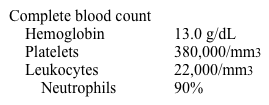A 48-year-old man is evaluated in the surgical intensive care unit for tachycardia and hypotension. He underwent a hemicolectomy due to a perforated colonic diverticulum yesterday. The patient has a history of hyperlipidemia but no known history of heart disease. His current medications include piperacillin/tazobactam, famotidine, and benzodiazepines and opioids for sedation.
The patient is intubated and the ventilator is in the assist control mode. His temperature is 39.4 C (103 F) , blood pressure is 86/55 mm Hg, and pulse is 142/min. Oxygen saturation is 99% on 40% FiO2.
Examination shows flat neck veins and tachycardia with an irregular rhythm. Breath sounds are heard bilaterally without wheezes or rhonchi. The abdomen is soft but diffusely tender and the incision is clean. The stoma is pink without any fluid output in the bag. The patient's extremities are warm with 2+ pulses and no peripheral edema. His urine output is 10 mL/hr.
Laboratory results are as follows:
ECG shows atrial fibrillation with rapid ventricular response. There are no significant ST-segment or T wave changes.
Which of the following would be the most appropriate next step in management of this patient?
Definitions:
Q15: A 41-year-old previously healthy man is admitted
Q18: The argument section of a trial court
Q20: The issue is composed of three parts.
Q21: A 65-year-old man is admitted to the
Q71: A 60-year-old man with alcoholism is admitted
Q94: An 89-year-old man is hospitalized because of
Q183: A 67-year-old woman comes to the physician
Q207: A 60-year-old woman comes to the emergency
Q213: A 23-year-old woman comes to the emergency
Q470: A 62-year-old man complains of a black